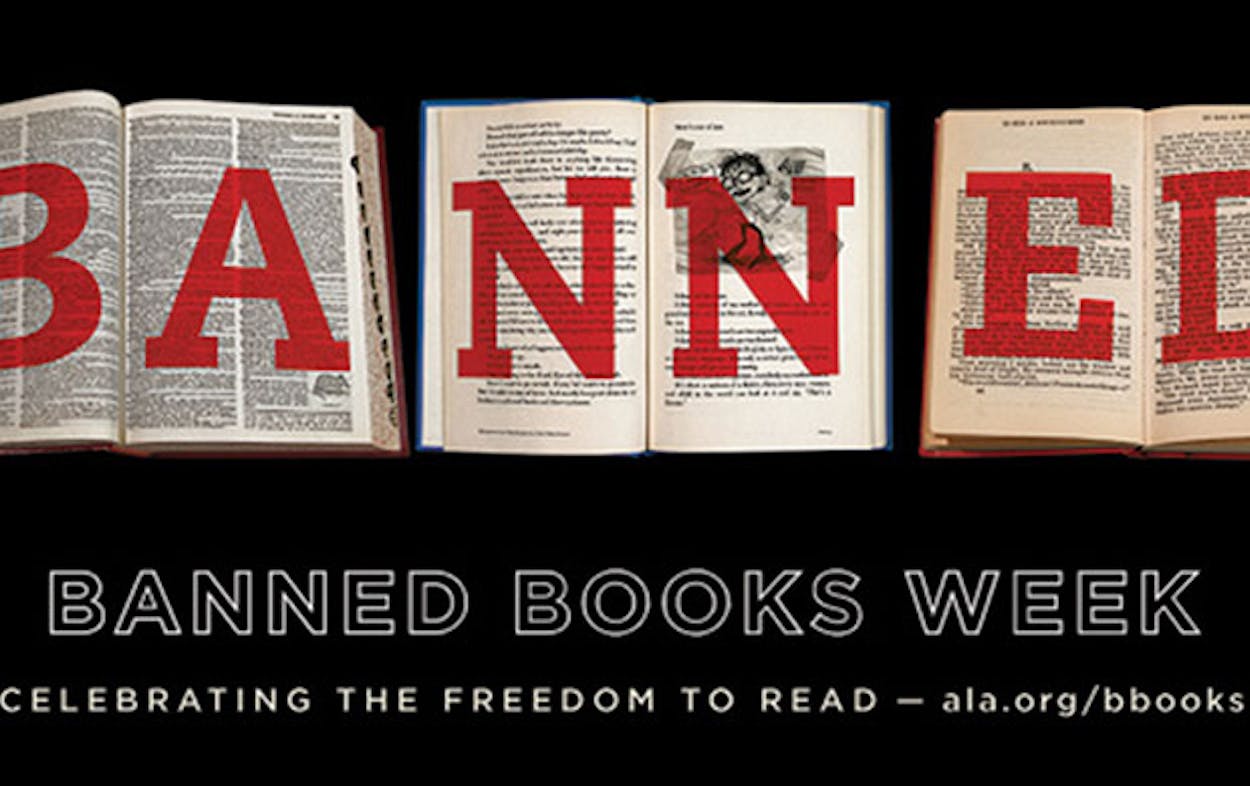It’s the American Library Association’s “Banned Books Week,” and Texas is banning fewer novels than ever, even as individual parents in certain ISDs still object to such classics as Huckleberry Finn and A Farewell to Arms.
That’s the upshot of the American Civil Liberties Union of Texas’s sixteenth annual report on the subject, “Free People Read Freely.”
The report says thirteen books were “banned” by Texas school districts last year and seventeen were classified as “restricted.” But as its overview explained:
This year’s report, which accounts for about 91 percent of the total number of Texas school districts, reveals some good news on the reading front. Over the past decade we have seen a steady decline in the number of books that have been challenged and banned, with 2003-04 and 2006-07 school years seeing a slight spike in challenges and bans. 2011-12 shows the lowest number of challenges and bans for the decade, with 50 challenged and 13 banned. This is an enormous step for Texas and a trend we hope will continue in the years to come.
Maggie Galehouse of the Houston Chronicle noted that only five of the thirteen books were “banned” at the middle or high school level, including Dean Koontz’s Dark Rivers of the Heart (for profanity, by Mae Luster Stephens Junior High in Linden) and Carolyn Mackler’s Love and Other Four Letter Words (for sexual content and nudity, by San Antonio Northside ISD middle and high schools).
Joni Eareckson’s When Is It Right to Die?, a book about suicide and euthanasia, was banned on religious grounds by Travis Middle School in Port Lavaca.
Eight more books, including Jeff Smith’s graphic novel Bone and Marcus Ewert’s illustrated transgender fairytale, 10,000 Dresses, were determined to be inappropriate for elementary school students, but they may have been taught to older students.
The report’s list of “restricted” books is longer, with such familiar titles as Ernest Hemingway’s A Farewell to Arms, S.E. Hinton’s The Outsiders, Tim O’Brien’s The Things They Carried, J.D. Salinger’s The Catcher in the Rye, and Gabriel Garcia Marquez’s Chronicle of a Death Foretold.
The list of challenged books also includes titles where no action was taken, a group that includes everything from a biography of Katy Perry (Eagle Mountain Saginaw ISD) and Michael Moore’s film Sicko (Edna ISD) to Mark Twain’s The Adventures of Huckleberry Finn (Mansfield ISD) and Chinua Achebe’s Things Fall Apart (Burleson ISD).
The full report includes complete descriptions of each book and school district, with the reasons for the challenge and the action taken.
As Robert Wilonsky of the Dallas Morning News reported, Allen ISD disputes the use of “banned” to describe its handling of D.C. Pierson’s novel The Boy Who Couldn’t Sleep and Never Had To, which was removed from Ereckson Middle School but deemed okay for high school students.
“It was challenged,” Allen ISD’s director of public information, Tim Carroll, told Wilonsky. “If they’re saying it’s more appropriate for a different age group, that’s just changing where it fits. The term ‘banned book’ is a loaded term.”
The American Library Association (as cited in the ACLU of Texas’s report) explains its terminology:
A challenge is an attempt to remove or restrict materials, based upon the objections of a person or group. A banning is the removal of those materials. Challenges do not simply involve a person expressing a point of view; rather, they are an attempt to remove material from the curriculum or library, thereby restricting the access of others. As such, they are a threat to freedom of speech and choice.







